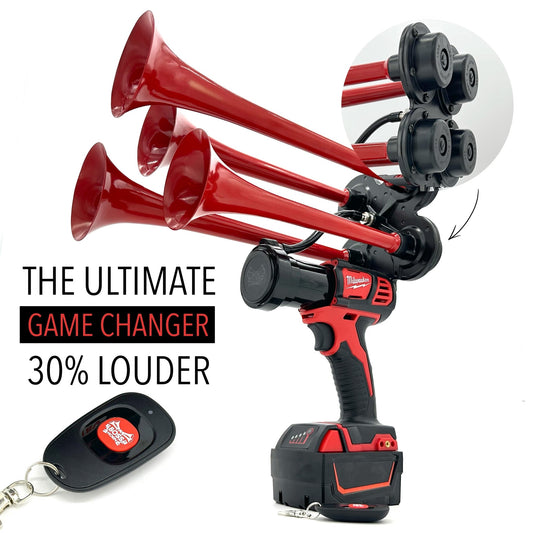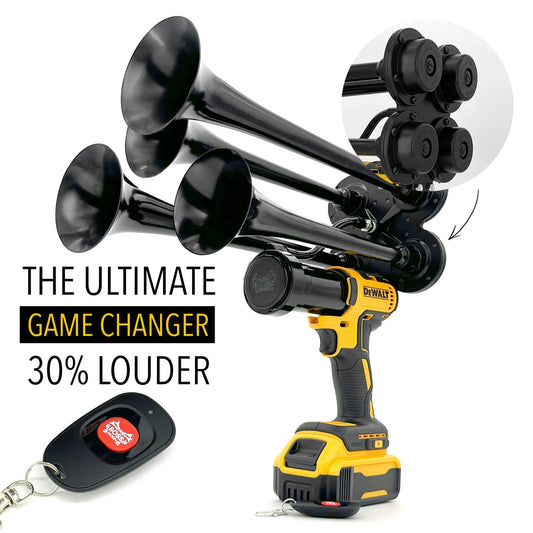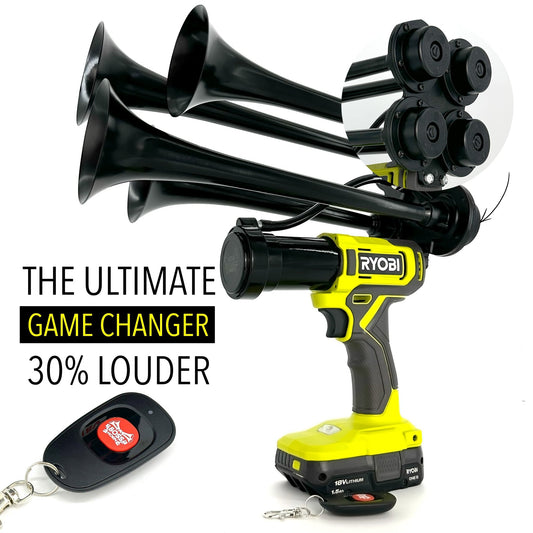Did you know that some truck drivers use a type of horn that is louder and more powerful than the standard horn found on most vehicles? This specific horn, originally designed for trains, has become a popular accessory for trucks seeking to make a bold statement on the road.
The use of these incredibly loud horns by truck drivers has raised safety concerns among transportation authorities. Due to their volume and intensity, these horns can startle other drivers on the road, leading to potential accidents and dangerous situations.
In response to the growing issue of trucks using these train horns on the road, many states have implemented laws and regulations to restrict their use. Violators can face hefty fines and penalties for using these unauthorized and dangerous horns.
In order to ensure the safety of all drivers on the road, it is important for truck owners to comply with these regulations and refrain from using train horns on their vehicles. By following the law and respecting the rights of others, we can help create a safer and more peaceful environment for everyone on the road.
What are the regulations surrounding train horns for trucks, and why are they considered illegal?
The use of train horns on trucks is illegal due to safety concerns and noise pollution regulations. Truck drivers are prohibited from using train horns because they can be confusing to other drivers on the road and can cause accidents. Additionally, the loud noise produced by train horns can disturb nearby residents and wildlife. To learn more about the reasons why train horns for trucks are illegal and the potential consequences for violating these regulations, continue reading the following section.
**Laws and Regulations regarding Truck Horns**
In the United States, trucks must adhere to specific regulations when it comes to the use of their horns. The Federal Motor Carrier Safety Administration (FMCSA) requires all trucks to have a properly functioning horn that can be heard from a minimum distance of 200 feet. This is crucial for ensuring the safety of both the truck driver and other motorists on the road.
**Reasons Why Truck Drivers Use Train Horns**
Some truck drivers opt to use train horns on their trucks for various reasons. Train horns are much louder than regular truck horns and can be heard from a greater distance. This increased volume can be advantageous in certain situations, such as alerting other drivers of a potential danger or signaling to pedestrians or livestock to move out of the way.
**Concerns and Risks Associated with Truck Horns**
While train horns may have their advantages, their use on trucks also raises some significant concerns. The loudness of train horns can be startling to other drivers on the road and may cause unnecessary panic or confusion. Additionally, the use of train horns on trucks may violate noise pollution regulations in some areas, leading to potential legal repercussions for the truck driver.
**Enforcement of Regulations**
Law enforcement agencies across the country are tasked with enforcing regulations related to truck horns. If a truck driver is found to be using a train horn in violation of FMCSA regulations or local noise ordinances, they may face fines or other penalties. It is important for truck drivers to familiarize themselves with the laws in their area regarding the use of truck horns to avoid any legal issues.
**Statistics**
- According to the FMCSA, truck horns must have a sound level of at least 90 decibels at a distance of 50 feet in front of the vehicle.
- In 2019, the FMCSA received over 4,000 complaints related to noise violations by trucks, including the improper use of train horns.
- Violations of truck horn regulations can result in fines of up to $1,000 for individual drivers and up to $10,000 for companies.
https://youtube.com/watch?v=9vm42sQfgak
1. What are the regulations surrounding the use of loud horns on trucks?
In many jurisdictions, regulations prohibit the use of loud train horns on trucks due to safety concerns. These regulations are in place to prevent unnecessary noise pollution and potential confusion on the road. It is essential for truck drivers to be aware of these regulations to avoid hefty fines and penalties.
- Be familiar with local laws and regulations regarding horn usage on trucks.
- Use appropriate and legal horns to comply with regulations.
- Avoid using excessively loud horns that may mimic train horns.
2. Why are train horns specifically prohibited on trucks?
Train horns are designed to be much louder and more powerful than standard vehicle horns, making them potentially dangerous when used on trucks. The sound of a train horn can startle other drivers and pedestrians, causing confusion and accidents on the road. Therefore, it is important for trucks to use horns that are appropriate for their vehicles.
- Train horns can cause confusion and startle other road users.
- The loudness of train horns may exceed legal noise limits for vehicles.
- Using train horns on trucks can lead to fines and penalties.
3. How can truck drivers ensure they are using legal horns on their vehicles?
Truck drivers can ensure they are using legal horns on their vehicles by checking with local authorities or transportation departments for specific regulations. It is also important to verify that the horn being installed on the truck meets safety standards and noise regulations. By using horns that are designed for trucks and comply with legal requirements, drivers can avoid legal issues and contribute to a safer driving environment.
- Check with local authorities for specific regulations on horn usage.
- Ensure that the horn meets safety standards and noise regulations.
- Use horns that are designed for trucks to comply with legal requirements.
4. Are there alternatives to train horns that trucks can use legally?
Yes, there are several alternatives to train horns that trucks can use legally. Truck drivers can opt for air horns, electric horns, or dual-tone horns that produce loud and effective sounds without mimicking train horns. These alternatives are designed to be compliant with legal regulations and ensure that trucks can alert other drivers of their presence safely and effectively.
- Air horns, electric horns, and dual-tone horns are legal alternatives to train horns.
- These alternatives produce loud sounds without mimicking train horns.
- Using legal alternatives ensures compliance with regulations and safety on the road.
5. What penalties can truck drivers face for using illegal horns on their vehicles?
Truck drivers who use illegal horns on their vehicles, such as train horns, can face various penalties and consequences. These may include fines, citations, and even license suspension. In addition, using illegal horns can result in increased insurance premiums and a tarnished driving record. It is crucial for truck drivers to adhere to horn regulations to avoid these penalties and maintain a clean driving record.
- Penalties for using illegal horns on trucks may include fines and citations.
- Continued use of illegal horns can lead to license suspension.
- Using illegal horns can result in increased insurance premiums and a tarnished driving record.
Conclusion
In conclusion, the use of train horns for trucks is illegal in most jurisdictions due to safety concerns and noise regulations. While some truck owners may be tempted to install these horns for added novelty or assist in alerting other drivers, it is important to adhere to traffic laws and regulations to ensure the safety of oneself and others on the road. It is crucial for truck owners to prioritize safety and be aware of the legal implications of using train horns on their vehicles. Failure to comply with these laws can result in fines, penalties, and even the revocation of driving privileges. Ultimately, it is best to refrain from using train horns for trucks and opt for legally approved warning devices to ensure safe and lawful driving practices.














